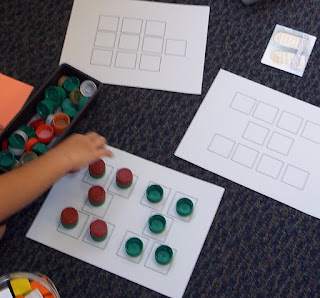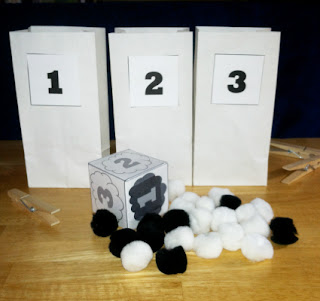It was a day in first grade that I will not forget. My student struggled to understand and I struggled to help.
For a while in our math lessons, we had been practicing single digit addition. We were working on becoming fluent...at least some of us were working on that. Others of us were working on really understanding the concept of addition. I sat with my friend, working through some addition practice. We had worked through several addition problems until we hit a wall. My friend was struggling with adding zero.
I pointed to the problem (because, you know, pointing at it makes it so much more understandable). I asked: "What is 7 plus 0?"
My friend stared at it and then looked up at me with his large dark eyes: "8?" he asked in a voice full of hope.
Thus began our great odyssey. We drew pictures of the problem. He drew them; I drew them. We pulled out counters with the problem. He manipulated them; I manipulated them. We looked at a number line. We tried all kinds of different ways, creating visual and mental representations of the problem.
Then...from somewhere...I got a thought. Every time we approached a problem with 0, his first guess would be a slightly higher number. (He did this every time until he got the "rule" about 0.) I wondered if he had developed an understanding about addition--that whenever you added, the answer would be a higher number. Was that the thinking behind his understanding of addition?
My friend stared at it and then looked up at me with his large dark eyes: "8?" he asked in a voice full of hope.
Thus began our great odyssey. We drew pictures of the problem. He drew them; I drew them. We pulled out counters with the problem. He manipulated them; I manipulated them. We looked at a number line. We tried all kinds of different ways, creating visual and mental representations of the problem.
I heard the frustration and dismay in his voice. I felt my own frustration grow, frustration not at him but at my inability to help him. Each time his answer would be 8 or 9 or 10. I couldn't fatham what his thinking was and he couldn't voice it enough for me to know. Then a light dawned. I don't know what we were doing at this point, drawing or counting or what, but he sat up a little bit and said tentatively, "7?"
"Yes!" I said (hopefully not too loudly). I immediately wrote down another problem with 0 and we were at it again. A hesitant guess and then the correct one. We did several. We talked that adding 0 was easy because the quantity didn't change. My friend worked on through his math practice until it was time to do something else.
Of course, we reinforced the next day and so forth. But that's not the point of this story.
I sat thinking about my friend - at the end of that day and through other days. I talked with other teachers but they mostly just nodded and said that they were glad he got it.
"Yes!" I said (hopefully not too loudly). I immediately wrote down another problem with 0 and we were at it again. A hesitant guess and then the correct one. We did several. We talked that adding 0 was easy because the quantity didn't change. My friend worked on through his math practice until it was time to do something else.
Of course, we reinforced the next day and so forth. But that's not the point of this story.
I sat thinking about my friend - at the end of that day and through other days. I talked with other teachers but they mostly just nodded and said that they were glad he got it.
Then...from somewhere...I got a thought. Every time we approached a problem with 0, his first guess would be a slightly higher number. (He did this every time until he got the "rule" about 0.) I wondered if he had developed an understanding about addition--that whenever you added, the answer would be a higher number. Was that the thinking behind his understanding of addition?
It makes sense; it's usually true, especially in kindergarten and first grade. Was his expectation that if there's a plus sign the number would go up? If so, no wonder he struggled with this 0 business.
I also thought about my frustration. And I was reminded about something I read in the book "Made to Stick" by Chip and Dan Heath. They write about the "Curse of Knowledge." Once you learn something it is impossible to put yourself in the mindset of someone who doesn't know it. It is impossible to think like someone who doesn't know.
I also thought about my frustration. And I was reminded about something I read in the book "Made to Stick" by Chip and Dan Heath. They write about the "Curse of Knowledge." Once you learn something it is impossible to put yourself in the mindset of someone who doesn't know it. It is impossible to think like someone who doesn't know.
Sometimes I think we adults forget this as we teach and talk to young kids. We say something, explain something - and expect that they know it. We draw a logical conclusion because it's logical to us; we have lots of stuff in our head and the conclusion just makes sense. But those young children don't have all that stuff in their heads. They will believe us because we are the adults but they may not understand it. They may form an alternative understanding about it that makes sense to them - and that they'll have to unlearn later.
In our classrooms (both younger and older), let's think about what we are doing and saying. Let's listen more than we talk so we can understand what children know and how they are thinking. Let's not just assume that something is easily understandable because it makes sense to us. Let's remember that we cannot put ourselves completely in the new learner's shoes.
Let's encourage exploring and playing. Let's help children construct a real and true understanding of concepts. Let's help build the thinking that lies underneath the knowing.
In our classrooms (both younger and older), let's think about what we are doing and saying. Let's listen more than we talk so we can understand what children know and how they are thinking. Let's not just assume that something is easily understandable because it makes sense to us. Let's remember that we cannot put ourselves completely in the new learner's shoes.
Let's encourage exploring and playing. Let's help children construct a real and true understanding of concepts. Let's help build the thinking that lies underneath the knowing.




